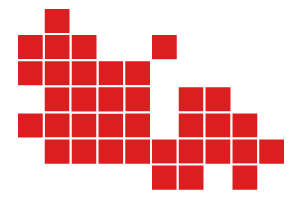[vc_row][vc_column][vc_column_text]
ABOUT THE AREA DIGITAL PLATFORM FUNDED BY THE CANADA FOUNDATION FOR INNOVATION
[/vc_column_text][/vc_column][/vc_row][vc_row][vc_column][vc_column_text]Every year, in Canada only, hundreds of professionals in all disciplines of the built environment submit their projects and portfolios of realizations to more than 70 institutions delivering awards for the recognition of high quality or excellence (Fig.1).
These cultural institutions and professional associations operate independently, without a mechanism to aggregate their collective wisdom over time and space. There is no platform on which they can share information and technical specifications on projects, not to speak of representations of the “lived experience” of each project, and thereby engage in a rigorous critical comparison of cases. This lack undermines collective learning among designers and evaluators of our living environments and prevents the diffusion of a culture of excellence in society at large.
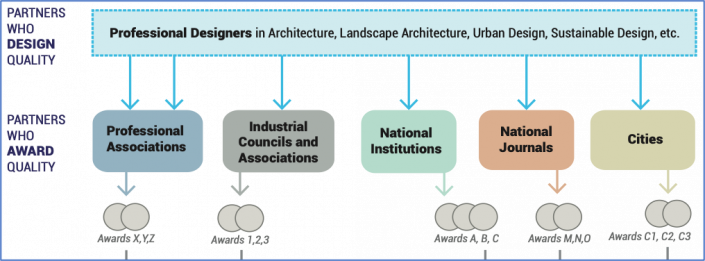
Fig. 1: The variety of organizations awarding “quality” echoes the diversity of design disciplines albeit with little interrelations[/vc_column_text][/vc_column][/vc_row][vc_row][vc_column][vc_column_text]The situation at hand calls for a large scientific as well as professional collaboration to pool information and resources together not only to document and share data but more importantly to develop a collective and reflective understanding of our built environments.
The Canada Research Chair in Architecture Competitions and Mediations of Excellence (www.crc.umontreal.ca), develops an original digital platform funded by the Canada Foundation for Innovation: the Atlas of Research on Exemplarity in Architecture database project.
The AREA Canadian network would thus benefit from this collective – open access – national resource being programmed in 2020 by the Université de Montréal centre of expertise for digital resources (CEN_R) along with consulting firm Humaneco.ca and it will be hosted by Compute Canada (Fig 2).
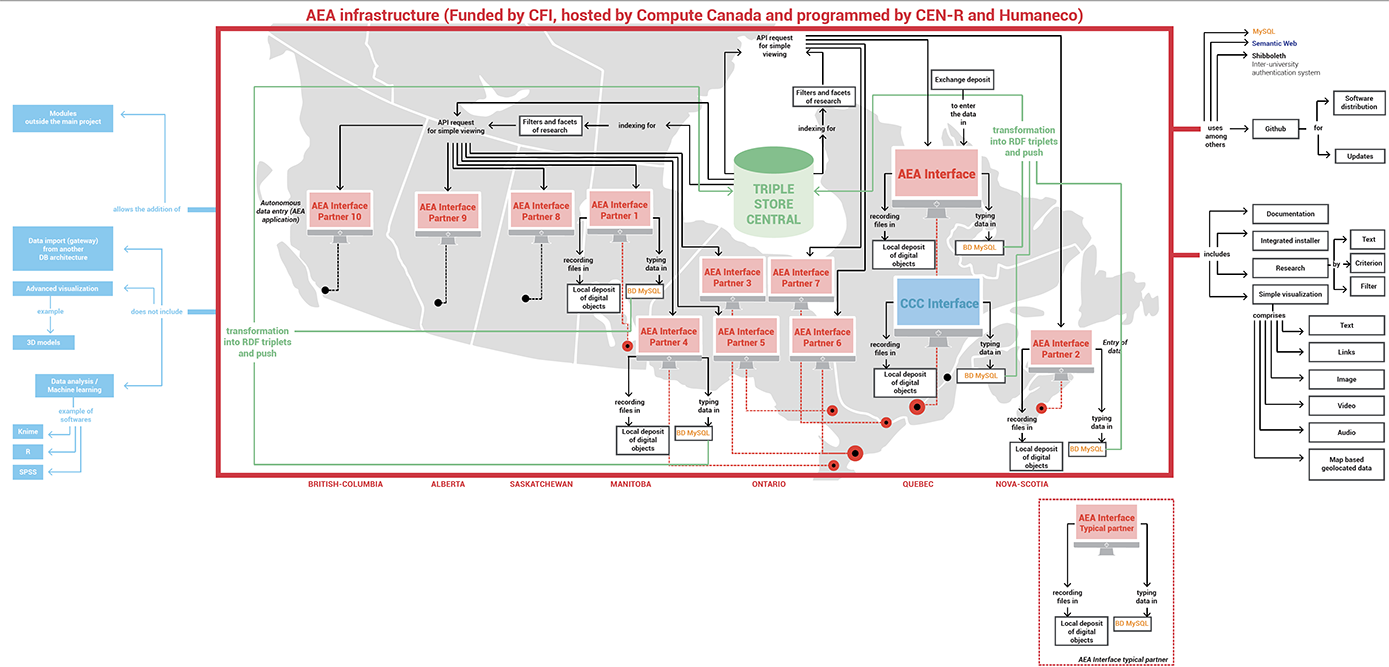 Fig. 2: AREA decentralized digital infrastructure funded by CFI, hosted by Compute Canada designed by CEN-R in 2020/2021
Fig. 2: AREA decentralized digital infrastructure funded by CFI, hosted by Compute Canada designed by CEN-R in 2020/2021
This new documentary database on awards of excellence in the fields of the built environment will be used to archive and analyze the information entered in the various research projects, including the cataloguing of factual data and user testimonials (oral history). There is currently no infrastructure to centralize, manage and preserve this type of data, which is managed on an individual basis and in a disparate manner according to the means allocated by the awarding institutions. In order to support the development of a network of researchers across Canada, it is necessary to develop an original computer tool that is intended to be an international standard.
The decentralized database which will be accessible to a vast network of Canadian researchers in early 2021. Unique and indispensable, it will allow for unprecedented links between a variety of contents (texts, images, technical files, BIM files, videos, etc.).
This database will facilitate the evaluation of changes in the built environment over time (monitoring) as well as the evolution of social and cultural concerns. At the request of our partners, it will be possible to evaluate the impact of human, social and environmental determinants of quality in order to better inform policies and to ensure public dissemination of the results.
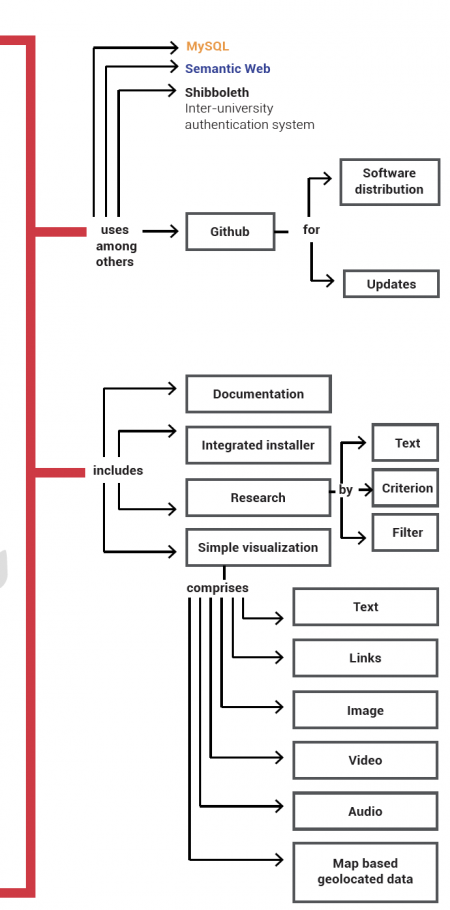
The IT project consists of setting up an infrastructure composed of data structures (relational and semantic) accessible via Web Interfaces or machines (for the semantic part), storage spaces and tools allowing the management of documents in the storage space, the management of data and the management of SPARQL (endpoint) requests. In addition, in the long term, visualization interfaces will allow a user to explore the Atlas of Excellence in Architecture. Data entry will be coordinated by a group of scholars throughout Canadian universities along with the help of graduate and undergraduate students.[/vc_column_text][/vc_column][/vc_row][vc_row][vc_column][vc_column_text]Schematic Diagram of Ontologies
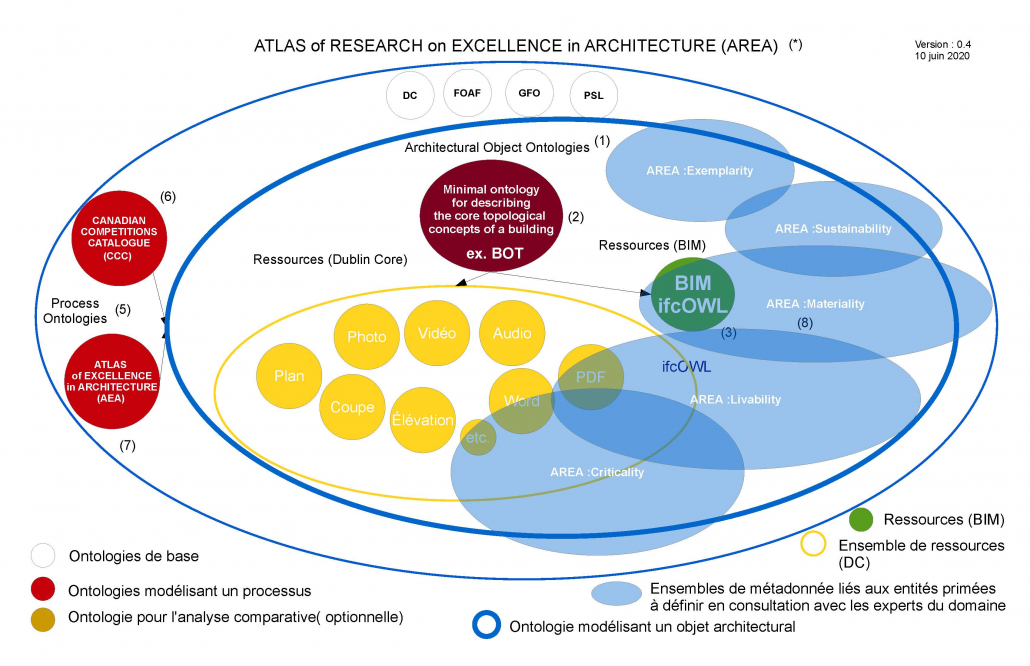 [/vc_column_text][/vc_column][/vc_row]
[/vc_column_text][/vc_column][/vc_row]
